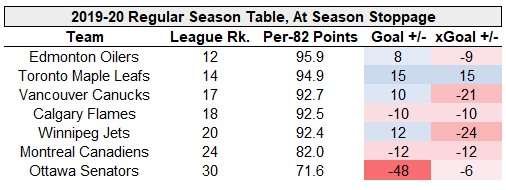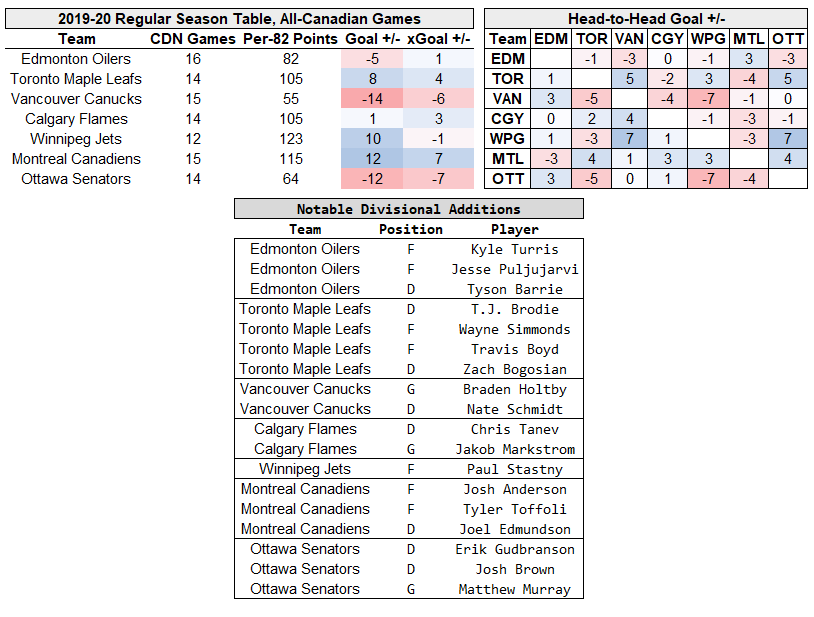Oct 15, 2020
Pondering the potential of an all-Canadian division in the NHL
The league might strike gold next season by making the most out of a very difficult economical and logistical situation, Travis Yost writes.
By Travis Yost

There has been some talk about the National Hockey League going with an all-Canadian division for next season, in large part due to the ongoing COVID-19 pandemic and the border remaining closed between Canada and the United States.
We got our strongest indication yet that the idea is well under consideration on Wednesday afternoon, thanks to a passing comment from Las Vegas Golden Knights owner Bill Foley.
Foley – addressing a question about the risk of trading defenceman Nate Schmidt to a division rival in Vancouver – suggested to Sportsbook Radio and Vegas Hockey Hotline host Brian Blessing that the risk would be minimized for at least next season because of the all-Canadian division.
The NHL has not publicly laid out plans for next season, still working to engineer a regular season that won’t force players into bubbles for months on end. But certain variables, like the closure of international borders, will force the league to make significant changes.
An all-Canadian division would not be hard to assemble – the league already operates one seven-team division (Central), leaving 24 American teams to be split into three other divisions. And much like the NHL’s experimentation with the play-in series for the 2019-20 postseason, an all-Canadian division could end up being a refreshing wrinkle to an oft-stale regular season.
Absent unsigned restricted free agents and a few notable unrestricted free agents, most rosters are now set. So, how competitive could an all-Canadian division be?
First, an overview of how these teams finished last season before the stoppage:

Their season ended as unceremoniously as possible – a play-in series loss to the lowly Chicago Blackhawks – but the Edmonton Oilers were the most successful of the seven Canadian teams in the regular season last year.
The bigger takeaway is that most of the Canadian teams were of similar performance – five teams were tracking to finish within three points of one another, which is remarkable. Even an underachieving Montreal Canadiens team pulled off a surprising postseason upset of the Pittsburgh Penguins, leaving the rebuilding Ottawa Senators as the lone minnow in the hypothetical division.
It’s also interesting that the Canadian teams, despite being tightly clustered against one another in the standings, had disparate results against one another.
If we subset the regular season table down to just the matchups where Canadian teams played one another, we see much noisier performance. That’s to be expected when you are only looking at 25 per cent of the full regular-season data, but I was particularly intrigued by how poorly Vancouver looked in their matchups, and how great Winnipeg and Montreal did in theirs:

It’s probably fair to say that Ottawa hasn’t done anything this off-season that would suggest they’ll improve on a last-place finish next year, but beyond their rebuilding efforts, this already-competitive group of teams has entered a subtle arms race – an expected consequence of six of these teams having qualified for last year’s postseason.
I’m particularly intrigued by Montreal, an already capable team at even strength that added two highly skilled forwards in Josh Anderson and Tyler Toffoli. Montreal still has some serious special-teams questions to answer next season, but do not discount how much success they had against their Canadian peers.
One other interesting wrinkle on this possible division – there are a number of big-name players moving from one Canadian team to another this off-season. T.J. Brodie (from Calgary to Toronto), Tyson Barrie (from Toronto to Edmonton), Chris Tanev (from Vancouver to Calgary), Jacob Markstrom (from Vancouver to Calgary), and Toffoli (from Vancouver to Montreal) could be seeing plenty of their former teams.
These teams are already hypercompetitive with one another in a normal season. In an all-Canadian division with a healthy serving of intra-division roster turnover? Let’s just say the league may be striking gold with such a restructuring, making the most out of a very difficult economical and logistical situation.
Data via Natural Stat Trick, Evolving Hockey, NHL.com, Hockey Reference

